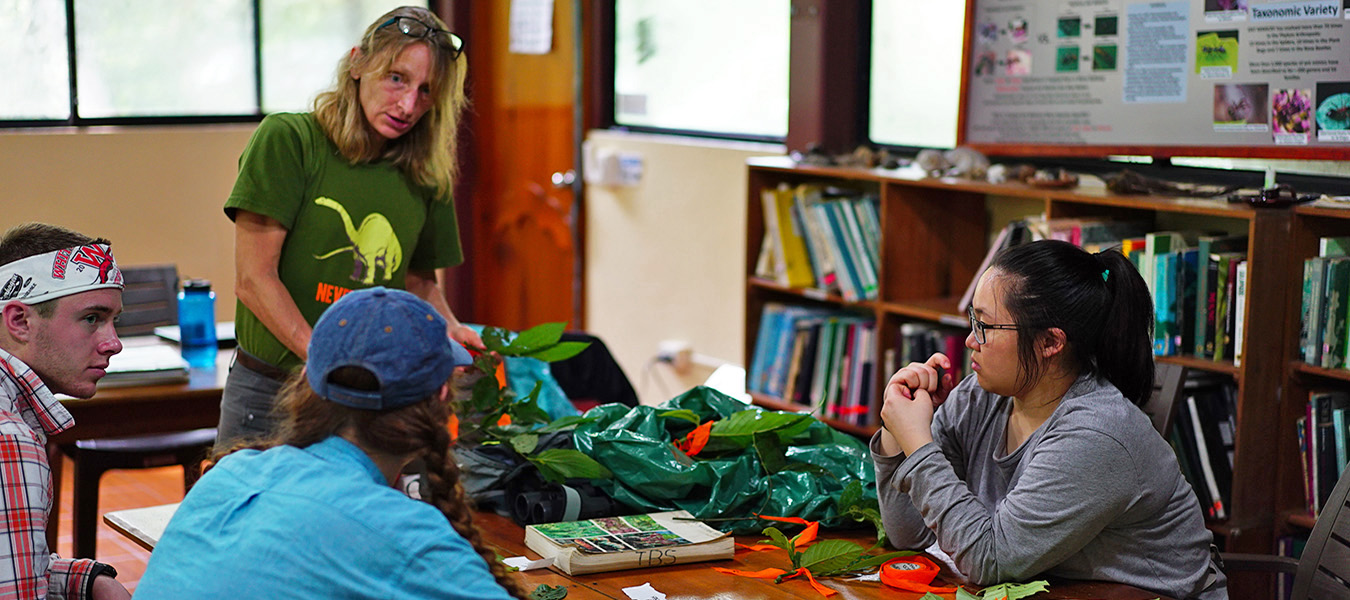
Ceiba has been dedicated to tropical conservation and community sustainability for over 25 years, and every aspect of your semester draws on that experience.
We see conservation as inherently multi-disciplinary, and have built our courses to reflect that ideal: every student has something unique and valuable to contribute, and subjects as diverse as economics, law, mathematics, engineering, and communication all play an important role.
Explore the hyper-diverse Amazon rainforest, misty Andean cloud forest, highland paramo, unique Pacific coastal dry forest, and the world-famous Galapagos Islands!
The Tropical Ecology course provides an in-depth study of general principals of ecology and evolution and a survey of major tropical ecosystems. You’ll study the ecology and conservation status of flora and fauna in each ecosystem, practice methods for biological surveys and monitoring, and learn about key environmental threats — all necessary elements for executing successful conservation projects.
Visits to Ceiba’s El Pahuma Orchid Reserve, national reserves around the snow-capped Antisana volcano, and Tiputini Biodiversity Station in the Amazon highlight this hands-on learning adventure. You’ll learn to identify flora and fauna in each habitat type, including over 25 plant families.
Lecture topics cover:
Field activities train you in standard methods for ecological research, including:
The course culminates in a small group research project which you will plan early in the semester, and carry out in the Amazon Rainforest during our two-week stay at the Tiputini Biodiversity Station. (4 credits)
Don't forget your mask and snorkel to explore marine life beneath the waves in the Galapagos Islands after touring the rocky tidepools and sandy shorelines on Ecuador's coast!
The Marine Biology course delivers an introduction to oceanography and an exploration of the ecology, evolution, and conservation of marine environments including coral reefs, mangroves and the deep sea. We discuss the many ways humans rely on the seas, how oceans interact with global climate, and how fisheries and marine reserves are managed.
Three weeks in the Galapagos, including a cruise of the islands, a family home stay, and your own underwater research project make this course a once-in-a-lifetime opportunity.
Lecture topics include:
Field activities include:
Once we reach the Galapagos, you and your team will conduct a research project on San Cristobal Island, where you may study sea lion behavior, habitat associations of reef fishes, sea turtles age and gender demographics, or the role of predatory fishes and sea urchins on algae cover. (4 credits)
Experience conservation in action at the Yasuni Biosphere Reserve, El Pahuma Orchid Reserve, and Galapagos Marine Reserve!
Conservation Biology offers you a thorough introduction to the science of conservation biology, combined with experiential learning in terrestrial and marine systems of conservation concern. You’ll master the theories behind conservation solutions, and address concepts such as habitat loss and fragmentation, population biology, land use, and reserve design and management.
The course runs concurrently with the terrestrial and marine ecology courses, so conservation problems and approaches are considered simultaneously with the aspects of the basic biology, ecology and natural history of these systems. This course exposes the multidisciplinary and complex nature of conservation problems, and the interplay among their biological, physical, social and economic drivers. Emphasis is place on the need for pairing conservation with sustainable development in the context of the rural communities and locally-run reserves we visit.
Lecture topics include:
Field activities include:
(3 credits)
Explore Ecuadorian culture from the highlands to the islands while living with host families near Quito and on San Cristobal Island in the Galapagos!
You will be paired with an Ecuadorian host family in the attractive university town of Cumbaya, just outside Quito, and be placed in a condensed Spanish language course led by native speakers.
Pre-course placement exams ensure you receive training appropriate to your existing command of the language. Intensive classes teach grammar, vocabulary and the richness of Latin American culture, helping you to adapt smoothly to life in Ecuador and communicate effectively during the program and beyond.
You’ll study on the campus of our partner university (Universidad San Francisco de Quito) for 3 hours per day during the first couple months of the semester, and are given by credentialed USFQ faculty. Courses are intensive and emphasize both grammar and communication skills to help you integrate rapidly into Ecuadorian life, and excel during your internship later in the semester.
Class activities involve discussions of Latin American culture, Ecuadorian history, current political and social issues, and also include vocabulary specific to the conservation and ecology topics you’ll be learning about in your other classes. (3 credits)
Gain valuable experience in locations ranging from rainforest to cloud forest, marine reserves to organic farms, or Ceiba's new conservation corridor on the Pacific coast!
You’ll work with a local organization to gain practical experience and contribute tangibly to projects in habitat protection, ecological research, environmental education, or sustainable development. Choose among internships located in field stations in the Amazon, dry forest, or mountainous cloud forest.
Early in the semester, you’ll make contact with one or more organizations of their choice to set up your internship placement. Ceiba maintains a list of organizations from which you may select, but past students have also established new contacts with organizations or faculty researchers whose interests align with their own. Final placements depend in part on your language skills and interests, and the current needs and priorities of host organizations. During the first few weeks of the semester you will discuss the details of possible projects with host organizations; you’ll also have follow-up meetings with your Ceiba instructors to discuss what internships would be best for you.
Before spring break, you will have chosen and organization and project on which to work, and signed an internship agreement with your future supervisor in which all your responsibilities and project goals are detailed. (2 credits)